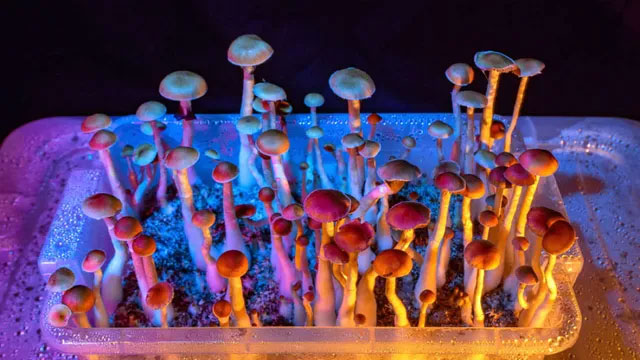A recent clinical trial has assessed the safety of psilocybin – a hallucinogenic compound found in “magic mushrooms” – and found that it does not produce side effects. Despite ongoing challenges, the positive results have bolstered the development of a psilocybin-based treatment approach for depression that has not responded to other therapies.
Researchers from the Royal College of London and the mental health care company COMPASS Pathways recently conducted a randomized controlled phase 1 trial of psilocybin, the active ingredient in this hallucinogenic mushroom. Just under 90 healthy volunteers were divided into three groups and received doses of 10mg, 25mg of psilocybin, and a placebo.

Psilocybin may be used to treat depression.
The researchers discovered that psilocybin enhances brain flexibility, with effects lasting for several weeks after use.
They suggest that these findings indicate psilocybin could be an alternative approach to treating depression, as it operates differently from conventional antidepressants.
Brain activity patterns in depression can become rigid and restricted, but psilocybin may help the brain escape this disordered state in a way that traditional therapies cannot.
Professor David Nutt, head of the Royal College’s Centre for Psychedelic Research, stated: “These findings are significant because for the first time we see that psilocybin works differently from conventional antidepressants, making the brain more flexible and less caught up in negative thinking.
This supports our initial predictions and confirms that psilocybin could be a genuine alternative to traditional depression treatments.”
Psilocybin is one of several hallucinogenic methods being explored as a potential therapy for mental health disorders.
The latest findings are based on brain scan analyses of approximately 60 individuals undergoing treatment for depression, led by the Centre for Psychedelic Research at Imperial College London.
The company behind this research is also conducting a randomized controlled phase 2 trial of psilocybin for 216 patients with treatment-resistant depression, marking the largest clinical trial of its kind to date.
| Psilocybin is a natural hallucinogenic compound found in over 200 species of mushrooms, particularly magic mushrooms – a common name for various genera such as Copelandia, Gymnopilus, Inocybe, Panaeolus, Pholiotina, Pluteus, and Psilocybe, with Psilocybe providing the strongest hallucinogenic effects. Generally, the effects of psilocybin include euphoria, visual and mental hallucinations, altered perception, distorted sense of time, and profound spiritual experiences. |
- The Strange Effects of Magic Mushrooms on the Human Brain
- Using “Magic Mushroom” Methods to Curb Smoking
- Little-Known Story of the Only Southeast Asian Team to Participate in the World’s Biggest Football Festival in 1938
- What Would Happen if Humans Sleep for 1000 Years? These Hypotheses Will Give You Surprising Answers!
- Xi’an, China Faces the “Rise of Tombs” and the Difficult Puzzle of Protecting Historical Sites

















































